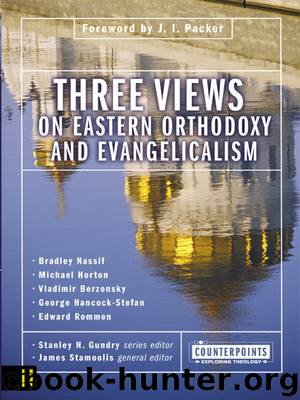Three Views on Eastern Orthodoxy and Evangelicalism by Stanley N. Gundry

Author:Stanley N. Gundry
Language: eng
Format: epub
Tags: ebook, book
Publisher: Zondervan
Eschatology
We do not have the space to address, even briefly, other areas of concern here. However, I would like to touch on one issue that is closely linked to the preceding: the final state. While many of Origen’s ideas were condemned as too indebted to paganism, Gregory of Nyssa’s De hominis opificio and Oratio catechetica emphasize the restorative nature of God’s punishment. Once more it seems that the transformationist model of theosis becomes a control-belief that shuts out the rest of biblical teaching. Father Tsirpanlis describes the dominant Orthodox perspective on this point:
Present as well as future punishment, in the mind of Saint Gregory of Nyssa, is educational, just a way to help the soul return to God. . . . So, the punishment of the fall has medicinal effects. Gregory’s view of Salvation is of a process of catharsis of the soul from the spurious material alloy of the evil by a purgatorial fire and through the divine force of God’s very love for man. Saint Gregory of Nyssa is certainly within the great Patristic Tradition of the first four centuries in considering Christ’s Redemption a means to an end, that end being the recon-secration of the whole universe to God.48
At least this writer discerns more echoes of Plato than of Paul. Even Satan is potentially saved by this saving work of Christ, says Gregory, as part of the process of reconsecration.49 Given the definitive role of human obedience through free will, the development of humanity into the likeness of God tends to eclipse the divine irruptions in human history. One cannot help but discern the similarity of this thinking not only to Origenist but even to Cappadocian formulations and the ideas of Stoicism and Neoplatonism. “Furthermore,” Father Tsirpanlis argues, “Universal Salvation is possible because man’s free will inherits intrinsically good [sic] and is by nature good as the chief feature of rational soul which is herself the plenitude of every good, since it is made in the Image of God.”50
But what of those who, despite the goodness of their free will and of their soul as the fountain of every good, do not cooperate sufficiently with God’s purposes for creation? “Then, after the Resurrection, the ‘fire will be the more ardent the more it has to consume.’”51 In spite of the difficult passages concerning the finality and severity of the last judgment, and the lack of any scriptural warrant for purgatory, Orthodoxy’s confidence in the moral powers of human beings reduces the horizon to the theme of cosmic transformation. The Orthodox use of soteria (salvation) “is more inclusive and stronger than the Roman Catholic term ‘redemption,’ and ‘reconciliation,’ and the Protestant ‘justification,’” Father Tsirpanlis tells us.52 But is it more inclusive? Is it not more likely that by identifying soteria with theosis, it has actually narrowed the range of what Orthodoxy can seriously incorporate from the whole biblical witness?
Download
This site does not store any files on its server. We only index and link to content provided by other sites. Please contact the content providers to delete copyright contents if any and email us, we'll remove relevant links or contents immediately.
Under the Banner of Heaven: A Story of Violent Faith by Jon Krakauer(1788)
The Early Centuries - Byzantium 01 by John Julius Norwich(1736)
The Amish by Steven M. Nolt(1563)
Taken by J. C. Owens(1556)
In Spirit and Truth (In Spiritu Et Veritate Series) by Reed Zoe(1544)
Play It as It Lays by Joan Didion(1503)
The Apogee - Byzantium 02 by John Julius Norwich(1446)
The Last Man in Russia by Oliver Bullough(1393)
David Sedaris Diaries by David Sedaris(1288)
A History of the Amish by Steven M. Nolt(1286)
The Dance of Change by unknow(1250)
Leaving the Witness by Amber Scorah(1247)
Fallen by unknow(1209)
Tears of the Silenced: A True Crime and an American Tragedy; Severe Child Abuse and Leaving the Amish by Misty Griffin(1191)
The Angel of Forest Hill by Cindy Woodsmall(1151)
Deep Blue by unknow(1140)
The Best of Amish Cooking by Phyllis Pellman Good(1139)
The Ariana Trilogy by Rachel Ann Nunes(1122)
Escape by Carolyn Jessop & Laura Palmer(1116)
